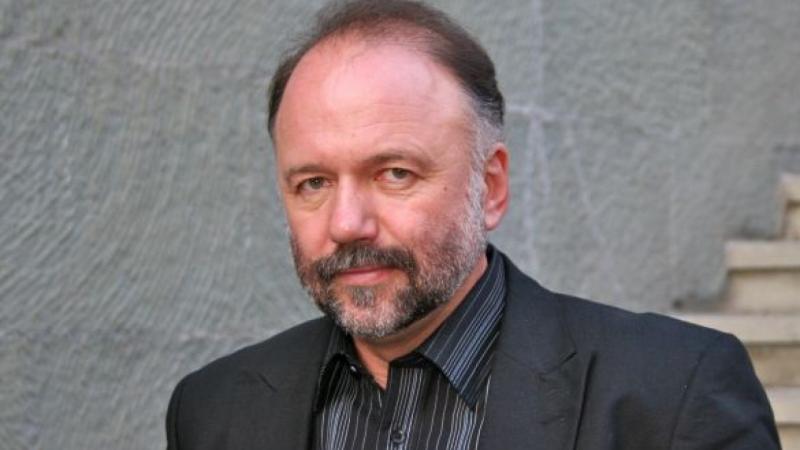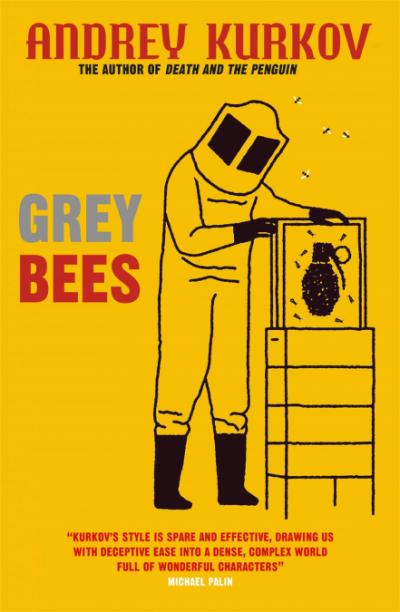Andrey Kurkov: Grey Bees review - light Ukrainian odyssey, with bite | reviews, news & interviews
Andrey Kurkov: Grey Bees review - light Ukrainian odyssey, with bite
Andrey Kurkov: Grey Bees review - light Ukrainian odyssey, with bite
Journey of a beekeeper lays bare the simultaneous severity and stupidity of conflict

This time, the Ukrainian author of Death and the Penguin, known for his brilliantly dark humour, has written a modern-day odyssey, with a return that is ambiguously hopeful.
Set initially in the "grey zone" of the Donbas region, formally contested by Russia and Ukraine since 2014 (but historically for years before that), it is fitting that the only two occupied streets in Sergeyich’s bombed-out village are "Shevchenko" (poet, figurehead for Ukranian nationalism) and "Lenin" (father of Soviet Russia, statues torn down in Euromaidan), representing two sides in a multifaceted conflict. The signs are later arbitrarily changed by Sergeyich, underlining their ultimate meaninglessness. Symbols proliferate throughout the book, explored through abstraction in Sergeyich’s dreams. One of his beehives is marked by a soldier with shell-shock and is later found to contain a grenade. The church in Little Starhorodivka is razed by shelling and its candles lead to the arrest of a member of a Muslim family whom he tries to help. Kurkov writes lightly, however, and none of these portents are as embarrassingly obvious as they could be.
 Both the severity and the stupidity of the various political games of tug of war in the region are clear throughout Grey Bees. Sergeyich passes through many different checkpoints whose occupants all have something to say about their country. He witnesses two politically fraught funerals, and himself buries a body at the bottom of his field. Behind these recent deaths are previous wars and grievances: Afghanistan, World War Two, and mass displacement under Stalin. The sense of nationhood and internal mistrust pervade the lives of all the characters he meets and come to infect one of his three precious hives. It is significant, however, that Sergeyich doesn’t attend the wake of a Ukranian soldier but does honour the death of a civilian whose nationality is not his own.
Both the severity and the stupidity of the various political games of tug of war in the region are clear throughout Grey Bees. Sergeyich passes through many different checkpoints whose occupants all have something to say about their country. He witnesses two politically fraught funerals, and himself buries a body at the bottom of his field. Behind these recent deaths are previous wars and grievances: Afghanistan, World War Two, and mass displacement under Stalin. The sense of nationhood and internal mistrust pervade the lives of all the characters he meets and come to infect one of his three precious hives. It is significant, however, that Sergeyich doesn’t attend the wake of a Ukranian soldier but does honour the death of a civilian whose nationality is not his own.
The sense of war’s futility extends to Sergeyich’s own life. He is ‘grey’ himself, after years of living in the grey zone – even his name sounds a little like the Russian and Ukranian words for that murky colour. He makes the big decision to leave Little Starhorodivka but his wanderings, though significant and symbolic, are peripatetic. He is brought into two families, but his own is remote. They represent other lives and other cultures that are either no longer, or cannot be his. Kurkov’s creation is perfect – a palimpsest, who seemingly emerges from each new interaction essentially unchanged.
This seeming lack of action and change in Grey Bees allows Kurkov to explore the most important challenges that his native Ukraine is currently facing. He could have written Grey Bees bombastically, angrily, but, although terrible things happen, through Sergeyich’s eyes they can be considered, filtered, and examined with sympathy. This is not to say that the book doesn’t have teeth – an overt criticism of Putin and the treatment of Muslims in the Crimea is perhaps the most significant moment – but Kurkov writes in such a way that the reader, like Sergeyich, accepts both how banal and how terrible most conflicts become.
- Grey Bees by Andrey Kurkov, translated by Boris Dralyuk (MacLehose Press, £14.99)
- More book reviews on theartsdesk
The future of Arts Journalism
You can stop theartsdesk.com closing!
We urgently need financing to survive. Our fundraising drive has thus far raised £49,000 but we need to reach £100,000 or we will be forced to close. Please contribute here: https://gofund.me/c3f6033d
And if you can forward this information to anyone who might assist, we’d be grateful.

Subscribe to theartsdesk.com
Thank you for continuing to read our work on theartsdesk.com. For unlimited access to every article in its entirety, including our archive of more than 15,000 pieces, we're asking for £5 per month or £40 per year. We feel it's a very good deal, and hope you do too.
To take a subscription now simply click here.
And if you're looking for that extra gift for a friend or family member, why not treat them to a theartsdesk.com gift subscription?
more Books
 'We are bowled over!' Thank you for your messages of love and support
Much-appreciated words of commendation from readers and the cultural community
'We are bowled over!' Thank you for your messages of love and support
Much-appreciated words of commendation from readers and the cultural community
 Robin Holloway: Music's Odyssey review - lessons in composition
Broad and idiosyncratic survey of classical music is insightful but slightly indigestible
Robin Holloway: Music's Odyssey review - lessons in composition
Broad and idiosyncratic survey of classical music is insightful but slightly indigestible
 Thomas Pynchon - Shadow Ticket review - pulp diction
Thomas Pynchon's latest (and possibly last) book is fun - for a while
Thomas Pynchon - Shadow Ticket review - pulp diction
Thomas Pynchon's latest (and possibly last) book is fun - for a while
 Justin Lewis: Into the Groove review - fun and fact-filled trip through Eighties pop
Month by month journey through a decade gives insights into ordinary people’s lives
Justin Lewis: Into the Groove review - fun and fact-filled trip through Eighties pop
Month by month journey through a decade gives insights into ordinary people’s lives
 Joanna Pocock: Greyhound review - on the road again
A writer retraces her steps to furrow a deeper path through modern America
Joanna Pocock: Greyhound review - on the road again
A writer retraces her steps to furrow a deeper path through modern America
 Mark Hussey: Mrs Dalloway - Biography of a Novel review - echoes across crises
On the centenary of the work's publication an insightful book shows its prescience
Mark Hussey: Mrs Dalloway - Biography of a Novel review - echoes across crises
On the centenary of the work's publication an insightful book shows its prescience
 Frances Wilson: Electric Spark - The Enigma of Muriel Spark review - the matter of fact
Frances Wilson employs her full artistic power to keep pace with Spark’s fantastic and fugitive life
Frances Wilson: Electric Spark - The Enigma of Muriel Spark review - the matter of fact
Frances Wilson employs her full artistic power to keep pace with Spark’s fantastic and fugitive life
 Elizabeth Alker: Everything We Do is Music review - Prokofiev goes pop
A compelling journey into a surprising musical kinship
Elizabeth Alker: Everything We Do is Music review - Prokofiev goes pop
A compelling journey into a surprising musical kinship
 Natalia Ginzburg: The City and the House review - a dying art
Dick Davis renders this analogue love-letter in polyphonic English
Natalia Ginzburg: The City and the House review - a dying art
Dick Davis renders this analogue love-letter in polyphonic English
 Tom Raworth: Cancer review - truthfulness
A 'lost' book reconfirms Raworth’s legacy as one of the great lyric poets
Tom Raworth: Cancer review - truthfulness
A 'lost' book reconfirms Raworth’s legacy as one of the great lyric poets
 Ian Leslie: John and Paul - A Love Story in Songs review - help!
Ian Leslie loses himself in amateur psychology, and fatally misreads The Beatles
Ian Leslie: John and Paul - A Love Story in Songs review - help!
Ian Leslie loses himself in amateur psychology, and fatally misreads The Beatles
 Samuel Arbesman: The Magic of Code review - the spark ages
A wide-eyed take on our digital world can’t quite dispel the dangers
Samuel Arbesman: The Magic of Code review - the spark ages
A wide-eyed take on our digital world can’t quite dispel the dangers

Add comment